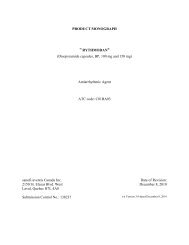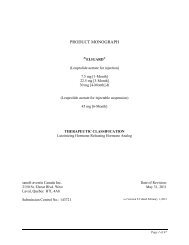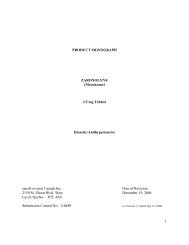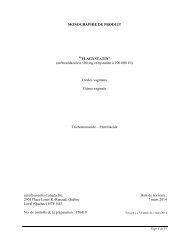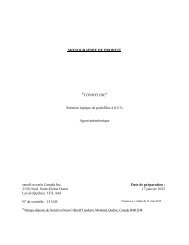Apidra (insulin glulisine) - Sanofi Canada
Apidra (insulin glulisine) - Sanofi Canada
Apidra (insulin glulisine) - Sanofi Canada
You also want an ePaper? Increase the reach of your titles
YUMPU automatically turns print PDFs into web optimized ePapers that Google loves.
Accidental mix-ups between <strong>insulin</strong> <strong>glulisine</strong> and other <strong>insulin</strong>s, particularly long-acting <strong>insulin</strong>s,<br />
have been reported. To avoid medication errors between <strong>insulin</strong> <strong>glulisine</strong> and other <strong>insulin</strong>s,<br />
patients should be instructed to always check the <strong>insulin</strong> label before each injection (see<br />
ADVERSE REACTIONS).<br />
Endocrine and Metabolism<br />
Hypoglycemia:<br />
As with all <strong>insulin</strong> preparations, hypoglycemic reactions may be associated with the<br />
administration of APIDRA. Hypoglycemia is the most common adverse effect of <strong>insulin</strong> therapy,<br />
including APIDRA (see ADVERSE REACTIONS). Hypoglycemia may occur if the <strong>insulin</strong> dose<br />
is too high in relation to the <strong>insulin</strong> requirement (see OVERDOSAGE). Use caution in patients<br />
with hypoglycemia unawareness and in patients who may be predisposed to hypoglycemia (e.g.,<br />
the pediatric population and patients who fast or have erratic food intake). Early warning<br />
symptoms of hypoglycemia may be different, be less pronounced or absent, under certain<br />
conditions, as for example if glycemic control is markedly improved, if hypoglycemia is<br />
developing gradually, in elderly patients, in patients with a long history of diabetes, in patients<br />
with diabetic nerve disease, in patients using some medications such as beta-blockers, or<br />
intensified diabetes control (see DRUG INTERACTIONS). Such situations may result in severe<br />
hypoglycemia (and possibly, loss of consciousness) prior to patients’ awareness of<br />
hypoglycemia.<br />
Severe hypoglycemia may require the assistance of another person. Patients who are unable to<br />
take sugar orally or who are unconscious may require an intramuscular/subcutaneous injection of<br />
glucagon or should be treated with intravenous administration of glucose by medical personnel.<br />
Without immediate medical help, serious reactions or even death could occur.<br />
The time of occurrence of hypoglycemia depends on the action profile of the <strong>insulin</strong>s used and<br />
may, therefore, change when treatment regimen is changed.<br />
As with all <strong>insulin</strong>s, prolonged or severe hypoglycemic attacks, especially if recurrent, may lead<br />
to neurological damage, loss of consciousness, coma or death (see ADVERSE REACTIONS).<br />
Hypoglycemic reactions following treatment with <strong>insulin</strong> products such as APIDRA are mostly<br />
mild and easily managed. Changes in <strong>insulin</strong> therapy or changes in life style (i.e. diet, omission<br />
of a meal, exercise/ physical activity) may require a change in dosage to avoid hypoglycemia.<br />
Glucose monitoring is recommended for all patients with diabetes.<br />
Diabetic patients should be instructed to carry a few lumps of sugar, candies or biscuits to<br />
prevent the progression of a hypoglycemic reaction, should one occur (see PART III:<br />
CONSUMER INFORMATION).<br />
Page 6 of 61



